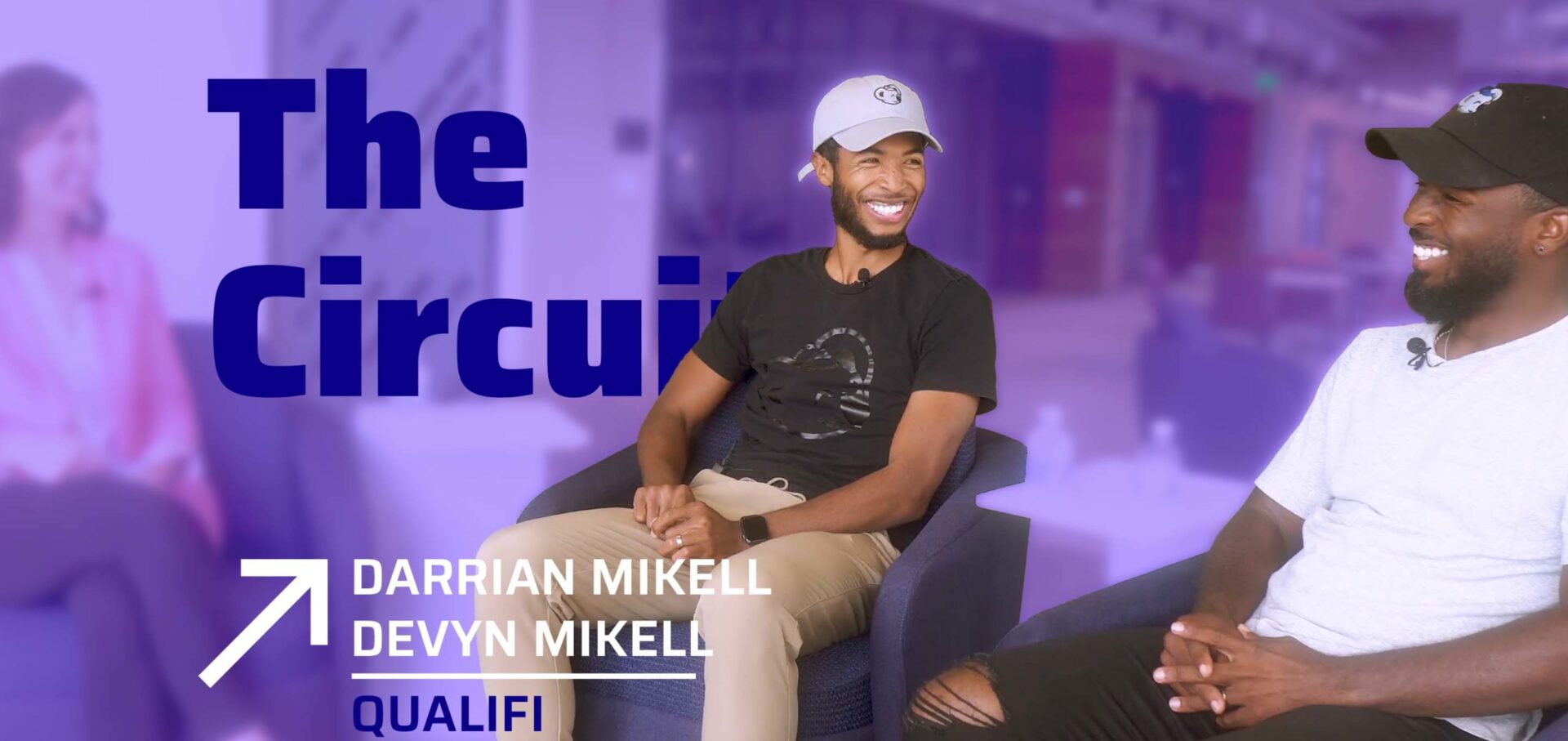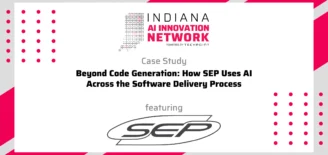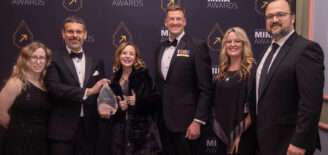Darrian Mikell, Devyn Mikell | Qualifi: Hiring at the Speed of People
In this episode, we talk to Darrian and Devyn Mikell, co-founders of Qualifi. Qualifi has accelerated the hiring process by eliminating phone-tag with asynchronous interviews. They talk about Qualifi’s origins, how recruitment has evolved since the company was founded, along with the story of how Darrian and Devyn’s entrepreneurial careers grew separately before converging with the founding of Qualifi.
Merillat Flowers
Darrian and Devyn it’s so nice for you all to come join us this afternoon. Glad to be sitting down with you to have a conversation.
Darrian Mikell
Yeah.
Devyn Mikell
Appreciate you.
Darrian Mikell
Thanks for having us.
Merillat Flowers
Very glad to. We’ll start first question with basics and get a chance for people to know a little bit more about Qualifi, what the platform does, what kind of customers that you all serve.
Darrian Mikell
Put Devyn on the spot… <Laughs>
Devyn Mikell
<Laughs> That’s funny. Yeah, so Qualifi is the phone screening platform for high-volume interviewing. So we’ve typically work with healthcare call centers, manufacturing and security companies to help them hire like hourly workers, mainly anywhere from $13 to $25 an hour to screen literally hundreds of people every day. So really driving efficiency for these, these businesses and helping them get their best talent faster.
Asynchronous Phone Screens and Qualifi’s Place in the HR Landscape.
Merillat Flowers
Okay. As you all I’m sure know, there’s lots of different HR platforms out there that are providing solutions. So I’m curious what opportunity you all saw back in 2018 in the asynchronous phone screening space and what challenge you all were trying to solve?
Darrian Mikell
Yeah, so, we both had our own different lenses into the world of HR. For me, it was at another side of company prior to this Viral Launch. We were scaling really fast. I was part of like the original team employee number one or two, and we went… we got to 70 people by the time I left and I oversaw a lot of the internal operations, including HR and recruiting, and just found myself super busy all the time with the all the different hats I was juggling. But with the repetitiveness, the like just, uh, administrative workload of coordinating even the first screen interview, I saw an opportunity there to create a better experience for myself, and also for candidates and then brought the idea to Devyn and kind of let him share.
Devyn Mikell
Yeah. So mine was completely different. So I had the food truck in college where I hired people for that. And then also during the, we call it the off-season of food trucking, we would, which is the winter, cuz it’s too cold to be out there and we would actually do side hustle. So my side hustle was, um, going and working in senior care. And so I had kind of oversaw a territory around Terre Haute, Indiana of a company called senior helpers. And so I experienced high churn environment. So every time I hired someone, they were usually gone within, you know, days to weeks, uh, depending on who it is. And so I’m constantly screening people just to get people in the, in the positions I need ’em so different experiences, but same problem, which was screening was just taking a lot of our day when we had other things we had to get to as well. So yeah, it was, it was really built for us more than anything.
Darrian Mikell
And then we saw just the kind of a void in the space there wasn’t, really anybody that we noticed doing, doing what we did today and the way that we imagined it and, um, sort of that conviction plus like finding new things out from the prospects that we were talking to, to just data in the industry around this specific step that we solve for today, taking the longest, uh, almost universally across all of recruiting. Um, we just saw that there was a something there. And we, that kind of built our conviction around what we do today.
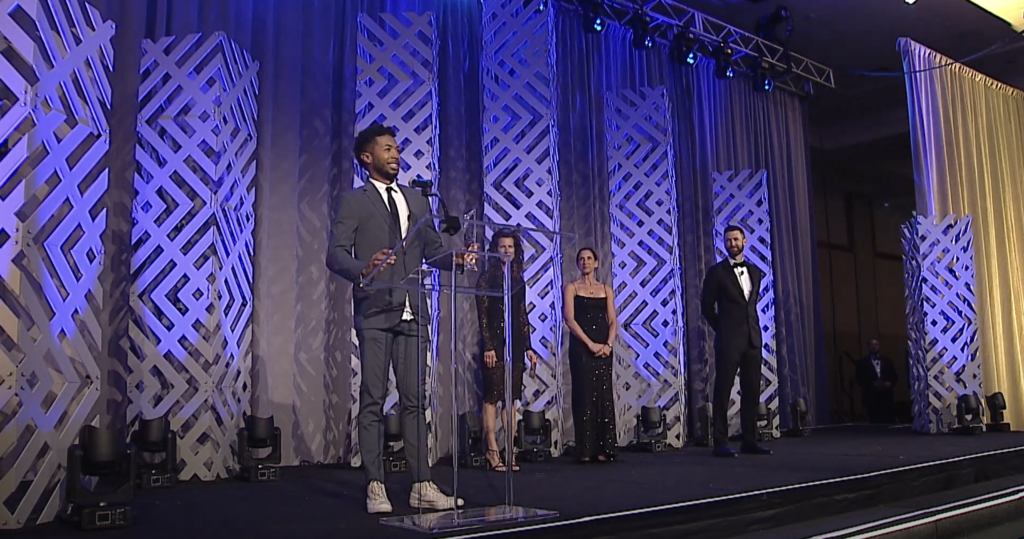
Qualifi’s Big Year: a Raise, a Mira, a Best Place to Work.
Merillat Flowers
It certainly resonates with me with the work I do at TechPoint and obviously it resonated with a lot of people. 2022 has been a huge year for you all two and a half million dollar raise, being part of the Indy Chamber’s Best Places to Work list and then nominated for four Mira awards. Of course, Darrian you taking home the rising entrepreneur award. So first of all, congratulations, what a year.
Darrian Mikell
Thank you. Sounds really good…
Devyn Mikell
…sounds very good…
Darrian Mikell
…when you put it that way.
Merillat Flowers
It sounds really good, because it is really good. And I’d love to hear you all reflect on the year and what you think has contributed to all of those successes.
Darrian Mikell
Yeah. I’ll start like it, it’s definitely rewarding, like to be recognized. Because prior to that, like the years that we were grinding were still grinding, but the years that we spent like, getting told no a lot from every single party basically, um, makes the fact that we persevered and, have got to this point where we’ve built a really great team. Um, we’ve built a product that we’re really proud of and that provides value to the customers that we serve. Um, just really rewarding to see that recognized from, you know, our peers and other people, um, you know, that they get to view us view what we do today. So
Devyn Mikell
Yeah, I think it’s just for a, at least for me, probably for you. I think the coolest part is I always tell people 2021 in the beginning of the year is me and him we’re full time. And then as that year went, we added about…
Darrian Mikell
Out in that year, probably like 13 or 15 years, yeah.
Devyn Mikell
At about, yeah. So just taking the snapshot of like one year’s time and what, you know, a difference people can make. And being able to like have all of our employees tell us one of the keywords about working at Qualifi is refreshing. Um, so like there’s something different that we’ve built. Honestly, sometimes it feels unintentional. Like we just were two brothers that started a company and kind of have some family values inherently in the business. And then two, we have been intentional to like try to drive culture as like the leading, key to our success. So for me, it’s been cool to just work with the people we work with every day, um, and start to see them generating ideas for something that we birthed and they’re helping us grow essentially. It’s kind of crazy to think about,
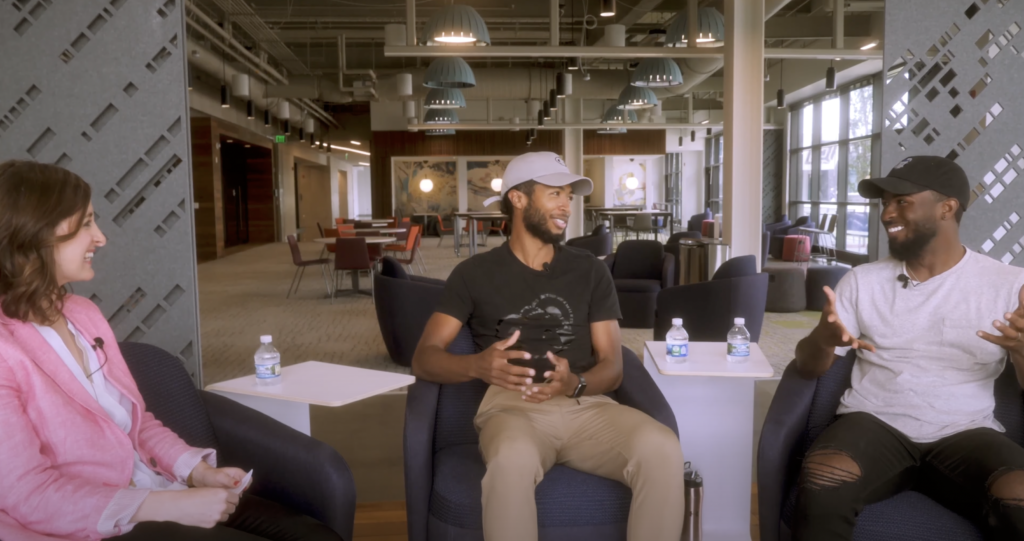
From Xtern Participant to Xtern Employer.
Merillat Flowers
It’s gotta be what a cool, what a cool thing to watch develop over time. And of course I’m excited to unpack that entrepreneurial journey that you’re talking about. In the grind, you all have seen a lot of things, in the short amount of time that you’ve been working in the industry. And so I first wanna start with you Devyn. I would be remiss if I didn’t bring up Xtern, it’s the kickoff of Xtern season right now as we’re in the summer. And you were a 2016 Xtern back in the day. So yeah, I’d love to hear you talk about that experience and, and perhaps how that shaped your journey from there.
Devyn Mikell
Yeah, that was, that was one of the best times I would say of my life was Xternship. I was like one I’m like living downtown for free getting paid amazingly as an intern at the time, working for Angie’s List, which was like the prominent figure in my head of a tech company in Indy. And doing something that, to be honest with you, I had probably very little business doing, like I was a product intern had never done that work before I just happened to be entrepreneurial. So they’re attracted to that. So for me, game changer in the world of like understanding how tech operates, cause in college, they don’t really, you don’t really get a lens into it. It’s just the reality of it. Um, that’s changing over time, but for me at the time I was like, I had never even seen anything like this, so it was great.
Devyn Mikell
And I actually had the opportunity to do the TechPoint fellowship with Angie’s List. I ended up doing the food truck, but had I not had the food truck, I easily would’ve been doing that. So it really changed a whole… My whole perspective on my career path. I was in what I would call like the legacy world where I’m thinking about supply chain and going to work for some big company to thinking about, you know, being entrepreneurial within a company, even if I’m not the one owning. It is really cool. So best time ever, highly suggest it to literally everybody that I talk to that’s in college. Even if they don’t have the experience, like just having the qualities is what clearly was, what, y’all were looking for at the time.
Merillat Flowers
That’s awesome. You are the Xtern dream. Now you’re flipping it. Like it’s incredible to see something you started there now starting their business here in Indiana and continue to invest and invest in this community. So…
Darrian Mikell
And being part of the Xtern process on the other side too…
Devyn Mikell
It’s wild.
Merillat Flowers
Now you’ve hired, so it’s full cycle. Really neat.
Devyn Mikell
It’s very meta… For me. This is crazy. Yeah.
Twisted Fry and College Entrepreneurs.
Merillat Flowers
That’s awesome. I am thinking about your time in college as well. And both of you started the entrepreneurial journey early on in the college phase. And so, you each also developed companies on your own that reflected the college space. You were trying to solve problems for the people that you were around every day, which I think is particularly interesting, cause not often do the journeys start trying to solve college-related problems. They often look outside into the business world. So curious about what drew you all to that kind of solution set.
Darrian Mikell
Yeah. For me. And it’s interesting to hear you say that for me, like I’ve, I’ve talked to like younger entrepreneurs and some of the things that I would encourage them is just like, continue, like don’t get discouraged if you don’t have like that home run idea, you know, while you’re in college, cause like it… What we do <laugh> I had no idea what like HR really was like recruiting really was in college. So getting more and more real world experiences like lends itself to like understanding problems that you can solve. But for me, at the time I just wanted to do something, you know? So I think the first legitimate thing that I think we incorporated was a t-shirt business. And so just trying to play off like maybe minimal influence that I had on the small campus that, that I was at. Working with a friend, it was really fun to get something started, to get it off the ground. Like we worked with other students that were like design majors to like come up with the brand and the different t-shirt looks that we had. And then we had a full, you know, launch event. Ultimately with like most of my business, they all tanked and folded. We learned a lot of lessons, but blessings. But that was fun to get to work with a friend of mine at the time anddo something creative. So that was, that was really the idea there for me at least.
Merillat Flowers
Makes perfect sense. You start there and that’s what you could relate to.
Darrian Mikell
Yeah. I don’t think I’ll be going back to, uh, hopefully not physical, physical goods for a while. Um, especially about t-shirts but yeah.
Merillat Flowers
What about you?
Devyn Mikell
Yeah, so I was… so one, I had the benefit of being younger. So I get to watch, you know, I’m four years behind Darrian so I get to watch his…
Darrian Mikell
Failure.
Devyn Mikell
I get to watch his like unfolding of the entrepreneurial spirit and it was attractive to me. So actually my first business ever was in high school and we painted, I don’t know if you ever remember this trend, but it was like galaxy print. Um, so we painted galaxy print shoes and sold them, bought the shoe for $10, sold it for like a $100. Which is cool. He knows for, uh, whatever that entrepreneurial club competitions are for the state of like high school. We did it for that. So DECA, there it is. Anyways, got to college and already knew I wanted to do that. And so, the benefit was just watching his start and then I was like, okay, I can do something. And so, went throughout the first years of school just was like floating and trying to figure out what to start and never found anything.
Devyn Mikell
And it was actually my track teammate, who’s now our co-founder DeSean, who we were on the bus coming back from track meet, told him, told everyone I was like, I wanna start a business. Whoever’s serious, hit me up. And then he’s the only one that hit me up. And we ended up coming together just thinking about different problems. We originally were gonna do real estate. It was too expensive. Um, for many reasons we didn’t do that… wish we did, but anyway. We just narrowed in on some issues that we saw, like with the nightlife. So Terre Haute didn’t have a lot of food options. People would drive after going out to drink. They would drive pretty far to get food and we’re like, well, that’s an issue. Let’s build something for it. And food truck just came to mind.
Devyn Mikell
And I love food trucks. Like I was just about that. And so we ended up starting that it ended up doing really well was one of the most popular, the most popular food truck or the only food truck in Terre Haute, but the most popular restaurant in Terre Haute from a follower standpoint. So it really was just about the culture that we were creating. And I think that like, to your point, just starting with something simple or whatever you deem simple at the time, um, building the muscle for whatever is next is kind of how I think about business in general now it’s like everything is just building muscle. So starting Qualifi was a lot easier to jump into than starting Twisted Fry, even though Qualifi is a much more complex business than the food truck was. So yeah, it was a game changer for sure.
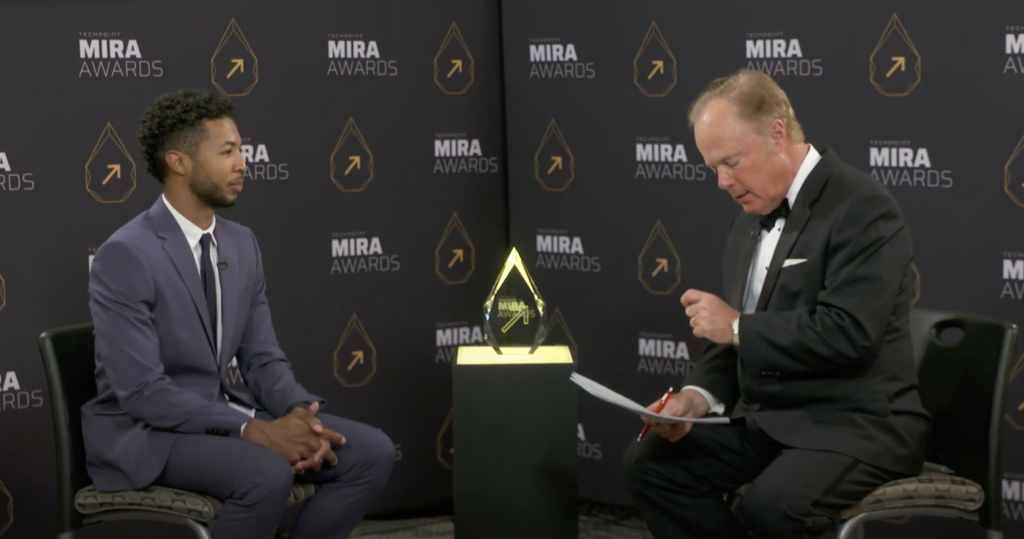
Morehead Communications and Viral Launch: Qualifi’s Prologue
Merillat Flowers
It’s incredible. Both of you being so committed right from the get go of like founding something, starting something, looking for the opportunities, which is really cool to hear about. And you’re also appreciate how transparent you both are about the challenges and inevitably like some failures along the way. Um, Darrian that’s something I’d love to hear you speak a little bit more about, you know, you started as a financial analyst at Morehead Communications, you spent a lot of time in Viral Launch. You started other companies that had come and gone. So throughout all of those different sints, you know, what do you think about when you think about the top takeaways and lessons learned in your journey?
Darrian Mikell
Yeah, I kind of joked about like, not being going in the t-shirt business, but you, you get to learn your likes and dislikes. And the challenges that inherently come with different, you know, industries that you get into. Like for instance, like with the t-shirt business, like our failure, I think was like marketing. Like we had a launch event and then after that, we didn’t know how to like get the word out. And so you learn like, oh well, what was like the downfall of this specific thing. It’s also very cost heavy, you have to like front, you know, money to buy inventory that you plan to sell if you don’t sell it, all those sorts of things. I think the biggest learning for me came with, Viral Launch, cause I was there for a longer period of time and I got to have a scope into every aspect of the business.
Darrian Mikell
I’m naturally a very ops driven person. So like even at Qualifi, I handle all like the back office type stuff. And so I enjoy that because I get to like peek into basically every department and understand at, you know, at some level what’s going on and have some influence into some of the decisions that gets made. And that was the case in Viral Launch and we went from basically ground zero. I came in when there was already some like revenue, but got to see it really scale and saw what worked and what it and what didn’t work. What were the challenges from going, you know, at different phases of the business, from a head count perspective, from a customer perspective, and all the infrastructure, like what do we need in place? And ultimately we faced challenges as we, you know, got bigger and bigger, um, that I definitely bring with me to Qualifi, in the sense of like, Hey, here’s what we shouldn’t do. Here’s some things that worked, um, that we should maybe duplicate. And from like a leadership standpoint, Hey, here’s how my experiences influence how I want to be as a leader. I think that’s probably the most important takeaway, is partially understanding what I liked and didn’t like from other leaders, but also just seeing how people react to certain types of leadership and trying to be the best leader I can. So, yeah.
Merillat Flowers
That’s cool. Powerful to hear all you’re maximizing all those past experiences.
Darrian Mikell
Yeah. Yeah. It, it teaches you like Devyn said, it helps you build muscle. And you don’t, you don’t know a lot of things and so you encounter them. And so by failing at things you get to encounter, <laugh>, you know, different reasons why stuff won’t work and you get to course correct and shortcut certain things and in what we do today. So yeah.
Brothers. Co-Founders.
Merillat Flowers
Well, to every point, both of you are off building muscle and on your own different entrepreneurial pathways, it’s helped Qualifi when the two of you as brothers decide to come together and start a company. So I would love to hear about the decision you made and why now, and also getting into a little bit about your relationship. What does that look like to be business partners and then also brothers and your personal life? How are they the same different from the ways that you show up with each other?
Darrian Mikell
Yeah. Do you wanna start?
Devyn Mikell
That’s a good question. So why now? We were kind of, it was like only a matter of time.
Darrian Mikell
Yeah.
Devyn Mikell
Yeah, he used to call me every… a lot more. Actually he used to call me a lot more <laugh> before we started the business, but he used to call me and just tell me like, ideas he had to commute to work like 45 minute commute. Yeah. So, so he actually would call me, tell me all his ideas. He still has the list. It’s like hundreds long now. He’s always been like more of ideas generator and a lot of them suck just for the record. <laugh> But, um, yeah, so he’d call, he’d call me and tell me a few. And that one resonated cause I felt it, it was the first time that happened. And so that was, that was it. There’s no like grand story of why, other than the fact that we both felt the pain, whereas before I couldn’t resonate with a lot of the stuff that, you know, he had experienced, or just thought of.
Devyn Mikell
So that’s been cool. And then like the flip side of what it’s like now I think the most important part is that we’re brothers first and that’s like, you know, everyone kind of talks down about family owned businesses and I’m like, I’ve only experienced great things from it. I’m sure there are bad parts, like I’m sure. But what we made clear in the beginning, again, probably unintentionally just who we are is that we’re family first and the business is secondary to that. So that always comes rings true. So like, I mean, every, it seems like every so often one of us will be down or up, and it’s usually inverse. So like usually when I’m down, he can pull me up and then vice versa, I can do the same. And we do that often. Cause it’s as you know, like the entrepreneurial journey is not easy. And so it’s really cool to have someone that like beyond just, talking about business, we can go into like how this is affecting our life. Right. So, um, our one-on-ones usually turn into just talking about life, which is fun, but that’s, that’s been my experience with it’s been best, best time.
Darrian Mikell
Yeah. I was gonna say like the, this is a, I guess based on the numbers, like half of like the dream that I have of, doing this with, so we have an older brother and then, our dad’s in business as well. And so like the, the goal would be like all four of us to do something like start something together. It doesn’t have to be software company. It could be, you know, something else. It could be… but just to like get to do that, like that’s always been part of the dreaming this was, this was definitely, special to get to work with him. And like he said, I think the most value that I, probably not the most, but like one of the biggest values is like that being on opposite sides of the roller coaster, at the right time is, is helpful.
Darrian Mikell
It’s rare that we’re both feeling down about what’s happening in the business. And so we can always encourage each other, pull each other out and you know, I don’t see honestly how like solo founders do it. It’s very, it is very hard to, to start anything there’s so much, uh, mental toughness and things that try you mentally. Um, so to have someone that you can always turn to and like already just have built in trust is really it’s really special. So yeah, like we, the other piece too, like it’s probably more boring than most people think. Like we, we work really well together just naturally. I think our personalities lend itself to working really well together. I know part of like other family businesses where it’s not the case. And then I think something else that I know I wanted to do was like, have everything up front, like, Hey, like what, how are we splitting things? You know, what are we getting paid? Like all that sort of stuff that can usually come into question if you don’t handle it like early, like we made sure to like have those conversations early. So, we, we know what’s what, and it’s not even an issue going forward.
Devyn Mikell
I always tell people, like we have very similar, like if you talk to Darrian and then talk to me separately, you’re gonna get kind of a similar result, but we, we have very different approaches to things. So like I am our resident rah rah guy, like I’m the try to be the energy in the room and like really, if we need something to get off the ground, like usually I’m the one that’s gonna go in first and excite people. He’s the very levelheaded one. And so like he thinks he thinks well, right. So like, whereas I get kind of hyped up on things or maybe think about things emotionally he’s very levelheaded, can think through things from multiple perspectives, but also we can both talk to customers at the same time. So like we’re very complimentary, but also similar. It’s weird. I wouldn’t say we’re like… He does what I don’t do kind of deal. It’s it’s a little bit different than that, but…
Darrian Mikell
I would say not to like be overbearing on, on this question, but, we’re both also pretty like broadly skilled. So like I consider myself a Jack of all trades as it relates to like back office op stuff. And like he’s very similar in the more customer facing elements. So like he’s been kind of a first man in on sales marketing product design partnerships. Like that’s kind of the nature of his role as it is today. So like be that. And then we create a process around it and, you know, hire someone into it. But we’re able to, I think that was a blessing when we first got started, cause we also had two other co-founders, which be remiss if we didn’t give them huge credit for helping it, like getting us literally off the ground with like the technology side. But from uh, you know, the non-tech side, we were able to like split that load pretty well. So yeah.
Merillat Flowers
So cool. That’s really, I think one of the most interesting aspects of the whole Qualifi journey is just the unique relationship with the two of you had and clearly the awareness of one another and the ability to play off of that with each other, your other co-founders. Hope your brother and dad get in on it. <laugh>
Darrian Mikell
<laugh> We’re hopeful. My brother, is like learning how to be or learning the cyber security space. So we’re like, oh sweet. Like he wasn’t in tech, you know, this, I were like, oh cool. Might be possible.
Devyn Mikell
It is possible.
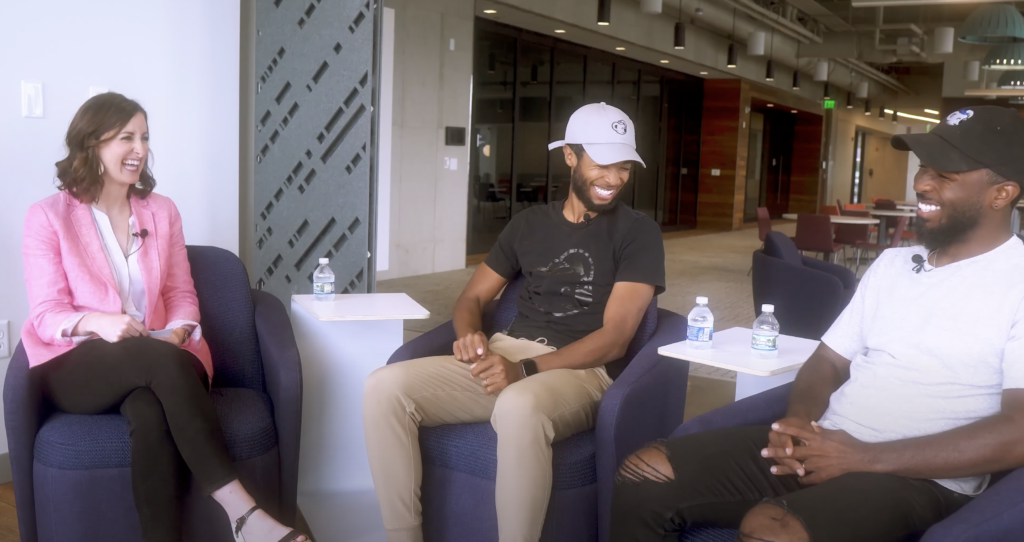
Launching Qualifi during COVID, the Great Resignation.
Merillat Flowers
That’s awesome. That’s awesome. Well, getting back to the product a little bit, I can imagine the wild ride that you’ve been on specifically in the last couple of years, you decide to start the company, 2020 rolls around of course, just like everyone in 2020, suddenly things are up in the air, but for you all that means remote work is now even more needed than ever. 2021 comes, we see the great resignation. So I’m curious what that’s been like for you all and how the product has evolved throughout the shifts that have been happening in our world and in the tech environment?
Darrian Mikell
Yeah. I’ve got to joke about this like a few times recently, so I’ll say it again. Like, so we had been working on this, it was like a side project idea, maybe late 2018. We officially incorporated in 2019 and then the pandemic rolls around. And at that time, uh, you know, there’s a lot of like grants and government funding that was available for folks that could like show that there was like a let down in revenue or they were negatively impacted by, uh, by COVID. And I joke and say that like, we weren’t able to show like we were negatively impacted cause we didn’t really have like a ton of revenue to begin with. So there was not a huge sling at percentages, but what we did is just like continue to stay like locked in. And I tell people all the time that, for us, I think the, my word last year was like, perseverance, cause there’s plenty of times that we probably should have quit, like could have quit.
Darrian Mikell
But we had that conviction and we, we stayed the course and um, and found where the opportunities were. We continued to, we continued to seek out, you know, where our believers were at. And I think that that was, how we were able to survive and get to where we are today. And, and get other believers from like an investment standpoint to back us as well to like help us to do that. And so yeah, from a product standpoint, we’ve definitely shifted and catered to the clients that we serve. Like we’re, I think we’re really great at listening and iterating on the product, but the core of what we thought we wanted to do is still the core of, of what we, you know, do today, which is pretty, pretty cool to see and kind of funny, honestly, cause like I think about, I honestly think about this today. Like folks are, you know, paying us really well for what we provide. And I imagine like if we came to like two years earlier, they would’ve like shut the door on us pretty quickly. Like it’s this funny that, you know, there’s probably like a, I don’t know if there’s an official term for it, but like just surviving gives you some level of credibility.
Devyn Mikell
That’s true. Yeah, was gonna, the only thing I was gonna say is just the audience really just is what changed and how we spoke to the audience really is how, what changed. So when you know, I people ask about the virtual work question and I’m like, honestly, it didn’t really change us. It changed how people think about us more than anything they’re like, uh, yeah, we need to be, you know, we need to get into the remote work like strategy. I’m like, well you, you already did phone interviews. Like it’s not <laugh>, it’s not like, it’s not like that was an in person thing. It’s just the, the mindset around it is different. So that helped us in, in a sense, it scared us for a while. Scared me for sure. I was like pivot, pivot, like I was ready, uh, to find something else and again, talk this off the ledge of that. Um, but yeah, more so just how we spoke to it, the value and then really keying in on the people that are successful with it when we started and just trying to double, double, double that. So, continue to build the case. Studies is really, I think we don’t notice it at the time, but I feel like that credibility is, is pretty huge.
Merillat Flowers
Yeah. Related to that Devyn. And who are the customers you think that have really thrived on the product and maybe particular industries that, suddenly this product really resonated with too during the Pandemic?
Devyn Mikell
Yeah. One of our favorite customers is in Indiana, uh, Reid Health they’re out of Richmond, Indiana. And they actually usually Indiana customers come from like a connection. They came from literally cold email. Like we just happen to get them in our pipeline and it just took off and they wanted to use it for every candidate that came through their whole, ATS. So for us that was huge. Like we were like normally people bucket us into like one specific area. They were like, no, we want to use it for everyone. So if they apply, they get an interview, which is cool. And so we were like, okay, healthcare has gotta be some, there’s gotta be something there. So we just started to dive in on that. And now we’re starting to roll out with, you know, two of the top 15 health systems in the country, which is crazy to even think about.
Devyn Mikell
So seeing that, I think it’s more of like legacy older businesses tend to like us a lot because they’re looking for small shifts that can make really big impact. They can’t move super fast to make changes, but ours is so nimble and we’re, we’re a smaller tool that can make a huge difference for organizations. And so, I think that’s really something that’s driven, a lot of results for us. Our other favorite is call centers just cause it’s so complimentary to what they’re doing. So if a phone interview they’re gonna be on the phone most of the time, and they’re super fast. So they’re making hires within the week and they can’t afford to not have pipelines. So we’re really like expediting their pipeline is really what we’re doing there. So those are our two, I’d say bread and butter. Yeah. They, I don’t even to be honest with you, our call center customers probably support a lot of Fortune 500 companies that we don’t know about. So we don’t necessarily get to say like, yeah, we support, you know, these companies, but that’s their job. So they’re call center staffing companies. So they usually support pretty big businesses.
Darrian Mikell
Yeah, so we go after, we haven’t kind of outlined it before, but like high, like high volume areas, whether that’s like large enterprises or mid-market companies that have high turnover into like my, I guess discredit, like when I first, when we first started, it was like, Hey, let’s go try to replicate my personal story, which was in the tech world. And, and we do support some customers that are, early stage companies that are scaling and don’t have similar use case. They just don’t have like the team, or maybe it’s like the CEO doing all of the recruiting, stuff like that. But we were able to, you know, find signal in other areas where that pain was felt, but it was like kind hit or miss, depending on which company we, we would talk to. So we learned and continued to, and like I said, seek out who, who needed it the most and felt that pain was.
Devyn Mikell
Yeah, and that was hard cause it’s ground zero. Yeah. Like most of the people at startups are able to build revenue from their connections. We don’t know hospital… like we don’t know these people. So it really like truly took longer to get to where we are because we, most people use network effects to, to build that. So it was a ground zero for us and it took a while to get to that realization too. So yeah. Lots of, lots of lessons in that first year of just trying to get off the ground, I was like, wow, we could have done this <laugh> but yeah.
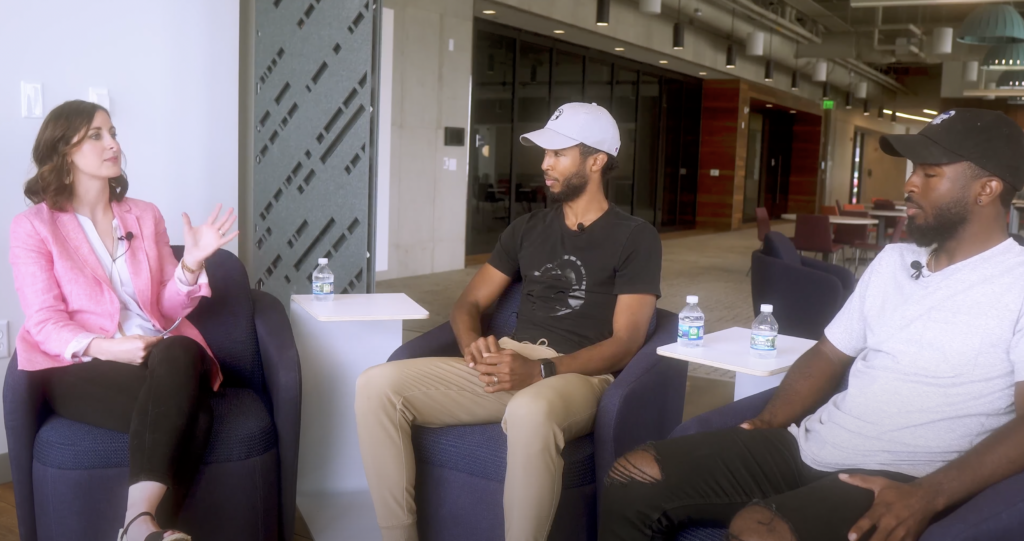
Qualifi and HR Tech’s Future.
Merillat Flowers
That’s the way it goes though. Y’all are obviously seeing a lot in the HR tech space and y’all are ideas people clearly. So I’m curious what other ideas are coming up for you as you watch some of the challenges that your customers are facing out there in the talent market. I mean, everybody in tech is talking about talent and workforce issues. So what else is you got?
Darrian Mikell
Yeah.
Devyn Mikell
We’re talking about ’em all the time.
Darrian Mikell
Yeah. We were talking about some earlier today without like giving away too much of the potential secret sauce. I think where we sit at in like the, the overall recruitment funnel is pretty close to the top of the funnel. So after a candidate applies generally is where a qualified interview would come into place at a first level screen. But what we hear regardless of the industry, almost probably regardless of like the market conditions too, is like, Hey, like we, we can always use more candidates. Like we can always, we always are looking for the best ways to source and find great people and attract them. And so I think that’s where a lot of our headspace has gone is like, how can we help our customers, our future customers, you know, generate that pipeline, uh, whether that’s through different networks or through, you know, better marketing and just attraction strategies. Um, and so…
Devyn Mikell
Yeah, that’s the, I mean, it’s just the idea that like we have thousands of candidates interviewing monthly for hundreds of jobs. So, there is a dis… I guess disproportionate amount of people that don’t get selected that we already have their interviews for. So I can leave it to the audience to imagine what that could mean for other people in the ecosystem to benefit from.
Darrian Mikell
Yeah. How can we, how can we provide value to the candidates? I’d say the other space too, that’s kind of core to who we are as a company is diversity. And for us is diversity as an advantage, but for like the product is like, how can we influence that? How can we bring insights to, you know, what your recruitment looks like today? And help you get to your DE&I goals, whatever they may be, or help showcase how, even if you don’t have those goals in place, how we can, you know, make your organization better, with some strategies in place.
Merillat Flowers
Along those lines, you all have an upfront seat to watching lots of employers, try to attract and, and retain talent through that kind of process. So what’s impacted the way you all have approached the employee experience from your hiring and, and then onboarding retention, um, throughout where the lessons you’re applying to your own business?
Devyn Mikell
Move faster, like is the number one thing <laugh> I think, unfortunately that’s the number one overlooked thing too. Like people easily get, um, I guess satisfied with 30 to 45 days or 45 to 60 days. And it’s like a norm. Ours is, I mean, we try to get our first round and second round done within like one to two weeks. And that’s been a huge advantage for us. We get to, you get to the decision conversations faster, you close faster, it’s kind of like sales. And we’ve had employees tell us, like that was part of the reason they chose us. So, I think that’s a highly overlooked and in my opinion, easy to implement. Yeah. Cause we subtle plug, like we, we can help that. Right. So, we utilize our own tool to move that first round faster. And in the second round is where that would’ve been a week out. We’re a week ahead. So that’s my number one.
Darrian Mikell
I don’t have any, I don’t know if stats are publicly available. I don’t have them, but <laugh> there, to my anecdotal knowledge, there’s a huge advantage to being like first to offer, like being first to offer a candidate puts you like, in such an advantage seat. I think in my opinion, so there’s that, and then also just like being intentional, I think for a small company, we’ve put a lot of specific things in place when it comes to our recruitment processes, our culture and how we define it. And, for instance, like one example of that is like we practice structured interviewing. So, it’s kind of inherent in the tool we we offer. So we use Qualifi ourselves partially to give candidates and insight into like what we do as a company, but also to create that consistency in our hiring process.
Darrian Mikell
But then when it comes to live interviews, every candidate for a specific job is gonna get the same interview experience recreated. So we’ll have the same people involved in the live panel asking the same questions, read, read from the screen. So it may feel slightly different than a typical interview where it’s a little bit more free flowing, but in this way, we’re able to ask the questions the exact way we want every, every candidate is gonna get that same experience. So it allows us to compare, you know, more objectively. Um, so that’s just like one, one example of, of, of that. But, um, from my knowledge, or from in my experience, it’s is a bit more than a lot of other small, smaller companies put into place.
Merillat Flowers
Those are great reflections and I feel like the theme of intentional and move faster is a perfect place to end reflect the whole conversation. So thank you so much for your time talking today.
Darrian Mikell
Yeah it’s been pleasure.
Merillat Flowers
And excited for what’s next.
Want to stay up to date on when the next episode of The Circuit is released? Make sure to subscribe to TechPoint’s Index newsletter. You can also subscribe and download the audio version of The Circuit on Apple Podcasts, Spotify, Stitcher, or where ever you listen to podcasts.

